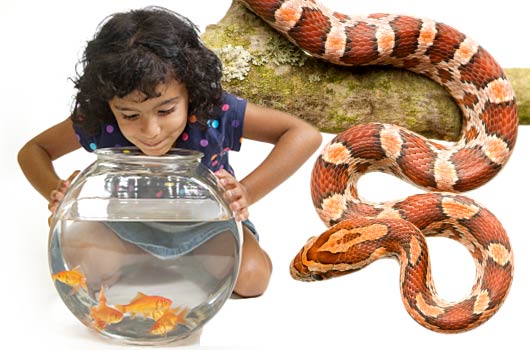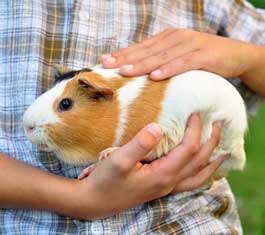
Having a small pet can not only be a fun and exciting experience for kids, but for the entire family as well. In addition, a positive pet experience can teach children valuable life lessons which can help them succeed in other areas of their lives—now and down the road. Starting with a small pet can help kids graduate to the responsibilities of keeping a dog, cat or bird, which require even more attention.
Pet ownership is not without risks. Most children do not have the experience and wisdom to choose suitable pets, and without parental guidance, they can later find that they are in over their heads. This can lead to a negative experience for the child and to a neglected pet. In order to prevent this, as a parent, you should set expectations by discussing with your child some of the following considerations:
- Time: Some small pets need more cleaning and attention than others; will the child be home enough to provide the necessary care and handling?
- Sleeping: Many small pets are nocturnal, and mainly come alive while your child is sleeping. Will any noise prevent your child getting a good night’s sleep?
- Expense: Will you (or your child) realistically be able to pay for the continued costs of feeding and maintaining the animal? Don’t forget about potential veterinarian bills.
- Smell: Some small pets, like rodents, can get stinky fairly quickly if their enclosures aren’t cleaned regularly.
- Allergens/Pet Hair: Will you and your children be able to tolerate any shedding or airborne materials emitted by the animal?
Once you’ve decided that small pet ownership is appropriate, it’s time to pick an animal that fits your family’s lifestyle. Here are some of the small best pets for children you may not have considered:
GOLDFISH
Goldfish are considered great pets for children because they are relatively low maintenance. In addition, a “beginner” goldfish is only a few dollars, a container of food lasts a long time, and they are quiet and basically odorless. Really, the only downside to a fish is that it is not a hands-on type of pet.
 GUINEA PIG
GUINEA PIG
Part of the rodent family, a guinea pig can make a great and surprisingly personable small pet. By most accounts, they will live 4-7 years. They love attention and will rarely bite as long as they are treated gently and handled regularly. In addition, unlike other rodents, they are awake and play during the day and sleep at night. You should clean and disinfect your guinea pig’s pen at least once a week, and provide fresh food and water daily. In addition, some, especially the longer haired variety, should be brushed daily.
Read Related: Why Pets are Great for Kids
BEARDED DRAGON
Besides having a cool name, this medium-sized lizard has an eye-opening appearance, too. More importantly, they are friendly and enjoy gentle human interaction. With proper care and diet, “beardies” can reach up to 2 feet in length as adults and can live up to 12 years. Maintenance is relatively low but they do require a heat source, full spectrum lighting, and daily feedings of insects and green vegetables.
CORN SNAKE
This beautiful and harmless snake is also known as the Red Rat Snake. It is both interesting to watch and easy to handle. Since they only need to be fed about once per week, they make great small pets for children with busy schedules, or children of divorced or separated parents who alternate homes, as they can be left alone for extended periods of time (i.e.: if you go on vacation). A Corn Snake is one of the easiest of all pets to maintain, requiring cleaning only every one to two weeks. They are quiet and odorless, and they should be handled on a regular basis. Their diet consists of one or two mice (which you can buy frozen from most pet stores) and fresh water. But keep in mind they grow to about 4 or 5 ft. and can live for up to 20 years.
RAT
I know what you’re thinking. But the truth is, domesticated rats, also known as “fancy” rats, are very clean and disease-free. And just like a dog, they can learn tricks, love to interact with humans, rarely (if ever) bite, and they groom themselves. They are easily fed a regular diet of pellets and fresh water every few days. While rats are naturally nocturnal, most pet rats will adapt to their owner’s schedule and wake up to play during the day. In order to keep any unpleasant smells to a minimum, your rat’s home should be cleaned at least weekly.
Whatever small pet you choose, it is important that you know what to expect, so that there are no surprises or regrets. Start by reading a book or care sheet with detailed information on the feeding and care requirements of the animal you are considering. And when the time comes, if possible, increase the chances of ending up with a well-cared for and healthy new pet by obtaining your pet from a reputable breeder rather than a pet store. You may also find some small pets available for adoption from local shelters or rescue groups.











